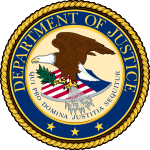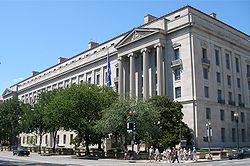United States Department of Justice
- For the animal rights group, see Justice Department (animal rights).
| Department of Justice | |
|---|---|
 |
|
| Department overview | |
| Formed | June 22, 1870 July 1, 1870 |
| Jurisdiction | Federal government of the United States |
| Headquarters | Robert F. Kennedy Department of Justice Building 950 Pennsylvania Avenue NW Washington, D.C. |
| Employees | 112,500+ (2005) |
| Annual budget | $46.2 billion (2008) |
| Department executives | Eric Holder, Attorney General Gary Grindler, Deputy Attorney General |
| Website | |
| http://www.usdoj.gov | |

The United States Department of Justice (often referred to as the Justice Department or DOJ), is the United States federal executive department responsible for the enforcement of the law and administration of justice, equivalent to the justice or interior ministries of other countries.
The Department is led by the Attorney General, who is nominated by the President and confirmed by the Senate and is a member of the Cabinet. The current Attorney General is Eric Holder.
Contents |
History
The Attorney General was initially a one-person, part-time job, established by the Judiciary Act of 1789, but this grew with the bureaucracy. At one time the Attorney General gave legal advice to the U.S. Congress as well as the President, but this had stopped by 1819 on account of the workload involved.
In 1867, the U.S. House Committee on the Judiciary, led by Congressman William Lawrence, conducted an inquiry into the creation of a "law department" headed by the Attorney General and composed of the various department solicitors and United States attorneys. On February 19, 1868, Lawrence introduced a bill in Congress to create the Department of Justice. This first bill was unsuccessful, however, as Lawrence could not devote enough time to ensure its passage owing to his occupation with the impeachment of President Andrew Johnson.
A second bill was introduced to Congress by Rhode Island Representative Thomas Jenckes on February 25, 1870, and both the Senate and House passed the bill. President Ulysses S. Grant then signed the bill into law on June 22, 1870. The Department of Justice officially began operations on July 1, 1870.
"Act to Establish the Department of Justice" bill did little to change the Attorney General's responsibilities, and his salary and tenure remained the same.[1] The law did create a new office, that of Solicitor General, to supervise and conduct government litigation in the Supreme Court of the United States.
With the passage of the Interstate Commerce Act in 1887, the Federal government in the U.S. began to take on some law enforcement responsibilities, with the Department of Justice tasked to carry out these duties.[2]
In 1884, control of federal prisons was transferred to the new department, from the Department of Interior. New facilities were built, including the penitentiary at Leavenworth in 1895, and a facility for women located in West Virginia, at Alderson was established in 1924.[3]
By 2008 several current and former assistant U.S. attorneys were known to have engaged in a wide variety of criminal conduct including sexual battery,[4] sexual abuse of children,[5] and failures to make mandatory conflict of interest disclosures.[6] A separate Office of Professional Responsibility (OPR) within the DOJ is responsible for investigating attorney employees of the DOJ who have been accused of misconduct or criminal activity with respect to their professional functions as DOJ attorneys. Former U.S. Attorney General John D. Ashcroft acknowledged challenges facing the Department of Justice:
In the real world of limited resources, we know that we can only detect, investigate and prosecute a small percentage of those officials who are corrupt.[7]
I remain convinced that there is no more important area in the fight against corruption than the challenge for us within the law enforcement and justice sectors to keep our own houses clean.[8]
Headquarters
The U.S. Department of Justice building was completed in 1935 from a design by Milton Bennett Medary. Upon Medary's death in 1929, the other partners of his Philadelphia firm Zantzinger, Borie and Medary took over the project. On a lot bordered by Constitution and Pennsylvania Avenues and Ninth and Tenth Streets, Northwest, it holds over one million square feet of space. The sculptor C. Paul Jennewein served as overall design consultant for the entire building, contributing more than 50 separate sculptural elements inside and outside.
Various efforts, none entirely successful, have been made to determine the meaning of the Latin motto appearing on the Department of Justice seal, Qui Pro Domina Justitia Sequitur. It is not even known exactly when the original version of the DOJ seal itself was adopted, or when the motto first appeared on the seal. The most authoritative opinion of the DOJ suggests that the motto refers to the Attorney General (and thus to the Department of Justice) "who prosecutes on behalf of justice (or the Lady Justice)".
The building was renamed in honor of former Attorney General Robert F. Kennedy in 2001. It is sometimes referred to as "Main Justice."[9]
Organization
Leadership offices
- Office of the Attorney General
- Office of the Deputy Attorney General
- Office of the Associate Attorney General
- Office of the Solicitor General
Divisions
- Antitrust Division
- Civil Division
- Civil Rights Division
- Criminal Division
- Environment and Natural Resources Division (ENRD)
- Justice Management Division (JMD)
- National Security Division (NSD)
- Tax Division
Law enforcement agencies
Several federal law enforcement agencies are administered by the Department of Justice:
- United States Marshals Service (USMS)
- Federal Bureau of Investigation (FBI)
- Federal Bureau of Prisons (BOP)
- National Institute of Corrections
- Bureau of Alcohol, Tobacco, Firearms, and Explosives (ATF)
- Drug Enforcement Administration (DEA)
- Office of the Inspector General (OIG)
Offices
- Executive Office for Immigration Review (EOIR)
- Executive Office for U.S. Attorneys (EOUSA)
- Executive Office of the United States Trustee (EOUST)
- Office of Attorney Recruitment and Management
- Office of the Chief Information Officer
- Office of Dispute Resolution
- Office of the Federal Detention Trustee (OFDT)
- Office of Immigration Litigation
- Office of Information and Privacy
- Office of Intelligence Policy and Review (OIPR)
- Office of Intergovernmental and Public Liaison
- Office of Justice Programs (OJP)
- Bureau of Justice Assistance
- Bureau of Justice Statistics
- Community Capacity Development Office
- National Institute of Justice
- Office of Juvenile Justice and Delinquency Prevention
- Sex Offender Sentencing, Monitoring, Apprehending, Registering, and Tracking Office (SMART)
- Office for Victims of Crime
- Office of the Police Corps and Law Enforcement Education
- Office of Legal Counsel (OLC)
- Office of Legal Policy (OLP)
- Office of Legislative Affairs
- Office of the Ombudsperson
- Office of the Pardon Attorney
- Office of Professional Responsibility (OPR)
- Office of Public Affairs
- Office on Sexual Violence and Crimes against Children
- Office of Tribal Justice
- Office on Violence Against Women
- Professional Responsibility Advisory Office (PRAO)
- United States Attorneys Offices
- United States Trustees Offices
- Office of Community Oriented Policing Services (COPS)
- Community Relations Service
Other offices and programs
- Foreign Claims Settlement Commission of the United States
- INTERPOL, U.S. National Central Bureau
- National Drug Intelligence Center
- United States Parole Commission
- Obscenity Prosecution Task Force
In March 2003, the United States Immigration and Naturalization Service was abolished and its functions transferred to the United States Department of Homeland Security. The Executive Office for Immigration Review and the Board of Immigration Appeals which review decisions made by government officials under Immigration and Nationality law remain under jurisdiction of the Department of Justice. Similarly the Office of Domestic Preparedness left the Justice Department for the Department of Homeland Security, but only for executive purposes. The Office of Domestic Preparedness is still centralized within the Department of Justice, since its personnel are still officially employed within the Department of Justice.
In 2003, the Department of Justice created LifeAndLiberty.gov, a website that supported the PATRIOT ACT. It was criticized by government watchdog groups.[10]
See also
- November Coalition
References
- ↑ "Act to Establish the Department of Justice"
- ↑ Langeluttig, Albert (1927). The Department of Justice of the United States. Johns Hopkins Press. pp. 9–14.
- ↑ Langeluttig, abby (1927). The Department of Justice of the United States. Johns Hopkins Press. pp. 14–15.
- ↑ "CNN finds a real expert on sex scandals: Kendall Coffey". http://miamiherald.typepad.com/changing_channels/2008/03/cnn-finds-a-rea.html. Retrieved April 18, 2008.
- ↑ "Federal Prosecutor Arrested In Child Sex Sting". http://www.clickondetroit.com/news/14132485/detail.html. Retrieved April 18, 2008.
- ↑ "http://laserhaas.wordpress.com/2008/03/05/doj-efforts-to-cover-up-mnat-perjury-and-fraud-now-receives-national-attention/". http://laserhaas.wordpress.com/2008/03/05/doj-efforts-to-cover-up-mnat-perjury-and-fraud-now-receives-national-attention/. Retrieved April 18, 2008.
- ↑ "The Second Global Forum on Fighting Corruption – U.S. Attorney General John D. Ashcroft remarks at the U.S. Department of State website". http://www.state.gov/p/inl/rls/rm/may/3387.htm. Retrieved April 18, 2008.
- ↑ "U.S. Attorney General John D. Ashcroft addressing The Hague". http://www.state.gov/p/inl/rls/rm/may/3387.htm. Retrieved April 18, 2008.
- ↑ Malek, Alia (March 30, 2007). "Partisan Civil Rights: Bush's Long History of Politicizing Justice". Spiegel Online. http://www.spiegel.de/international/0,1518,474911,00.html. Retrieved 2009-07-26.
- ↑ .gov Watch, October 18, 2007
External links
- Official website
- Organization chart
- Department of Justice Meeting Notices and Rule Changes from The Federal Register RSS Feed
- USDOJ Documents Post 9/11 Memos, OIG Reports ...
- 4 Torture Memos Released 16Apr2009 in response to FOIA suit by ACLU.
- Proposed and finalized federal regulations from the United States Department of Justice
- Human Rights First; In Pursuit of Justice: Prosecuting Terrorism Cases in the Federal Courts (2009)
|
|||||||||||||||||||||
|
|||||||||||
|
||||||||||||||||||||||||||||||||||||||||||||||